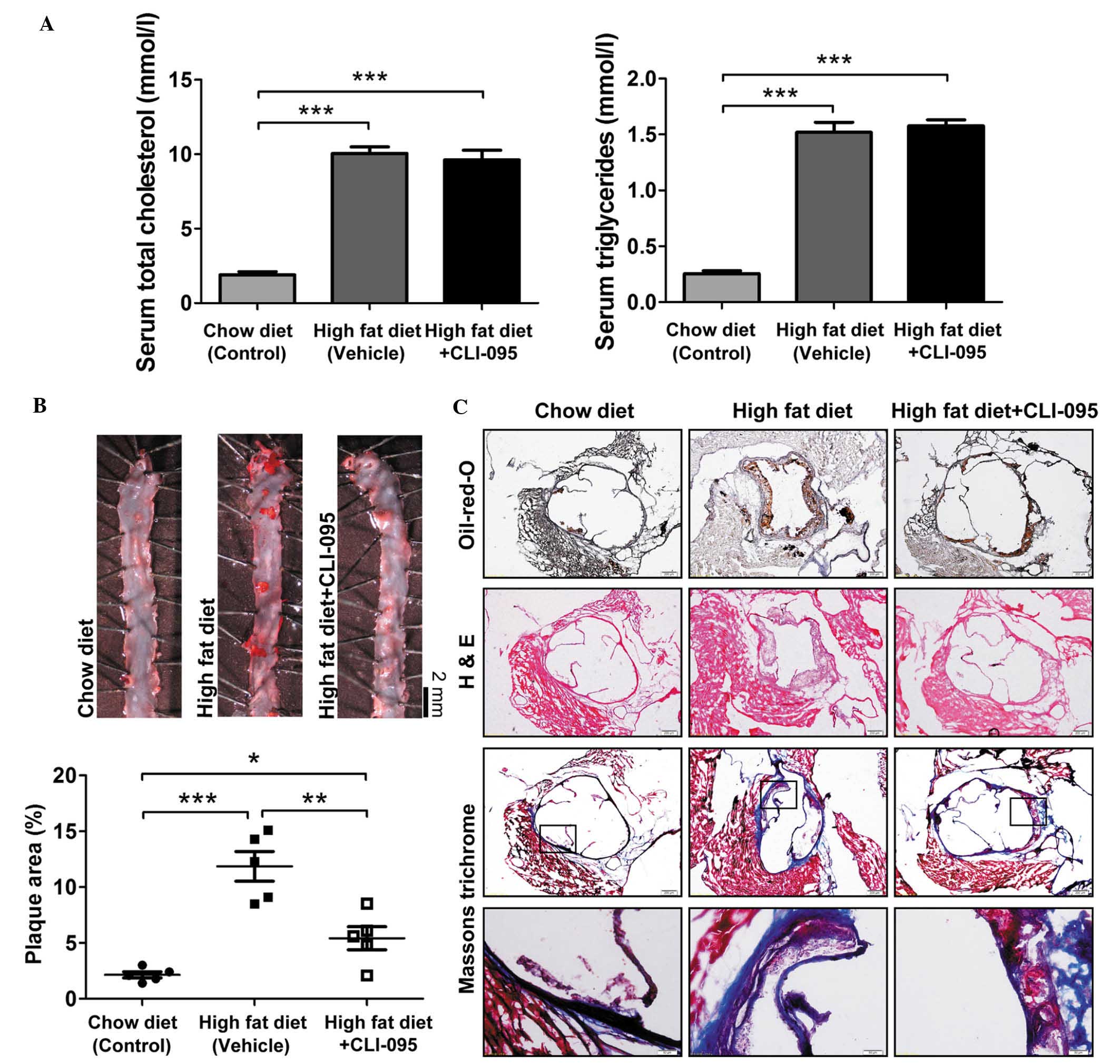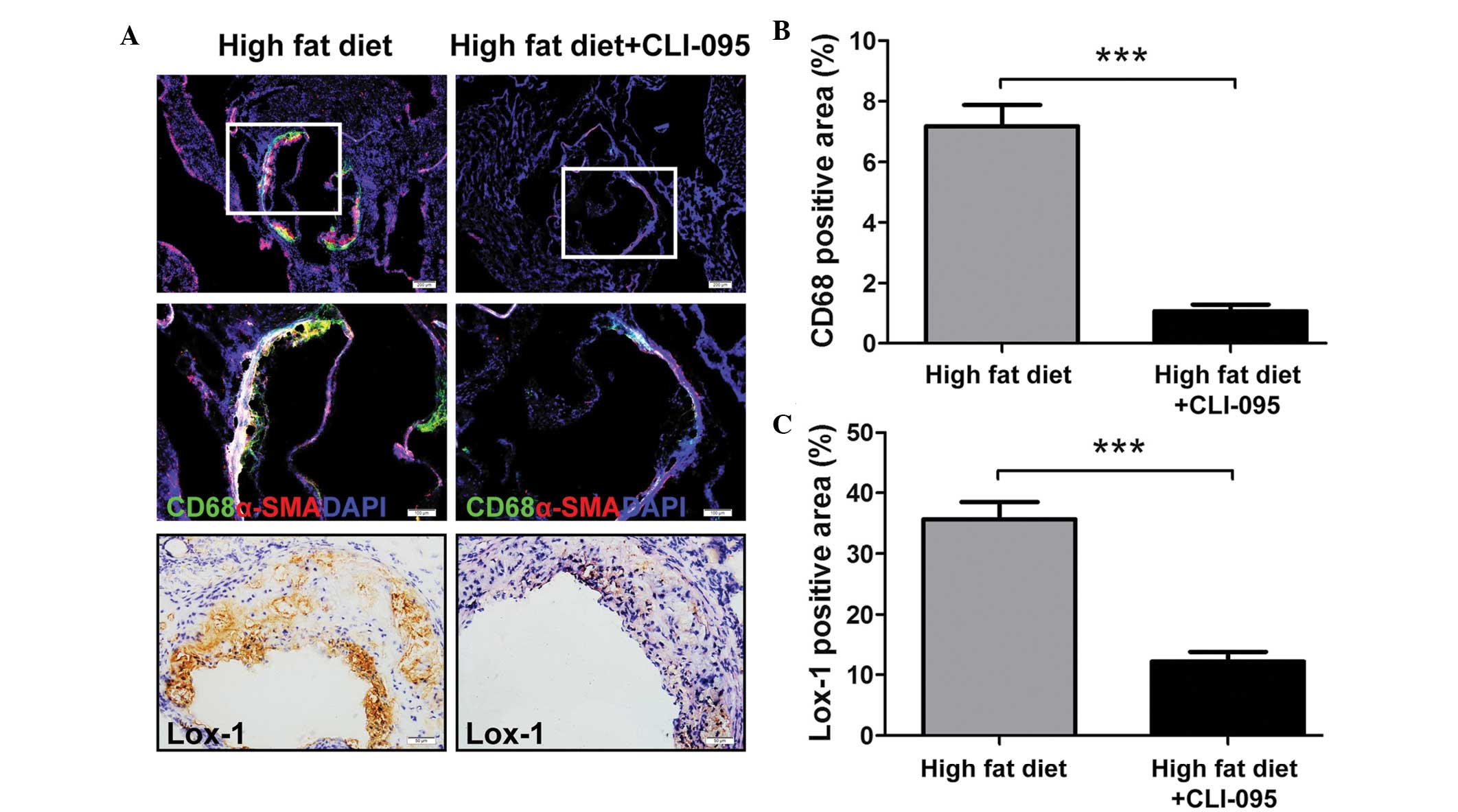|
1
|
Yang Z and Hall AG: The financial burden
of overweight and obesity among elderly Americans: The dynamics of
weight, longevity, and health care cost. Health Serv Res.
43:849–868. 2008. View Article : Google Scholar : PubMed/NCBI
|
|
2
|
Hansson GK: Inflammation, atherosclerosis,
and coronary artery disease. N Engl J Med. 352:1685–1695. 2005.
View Article : Google Scholar : PubMed/NCBI
|
|
3
|
Libby P, Ridker PM and Hansson GK:
Progress and challenges in translating the biology of
atherosclerosis. Nature. 473:317–325. 2011. View Article : Google Scholar : PubMed/NCBI
|
|
4
|
Hansson GK and Libby P: The immune
response in atherosclerosis: A double-edged sword. Nat Rev Immunol.
6:508–519. 2006. View
Article : Google Scholar : PubMed/NCBI
|
|
5
|
Zhuang J, Peng W, Li H, Lu Y, Wang K, Fan
F, Li S and Xu Y: Inhibitory effects of vinpocetine on the
progression of atherosclerosis are mediated by Akt/NF-κB dependent
mechanisms in apoE−/− mice. PLoS One. 8:e825092013.
View Article : Google Scholar
|
|
6
|
Wu S, Xu H, Peng J, Wang C, Jin Y, Liu K,
Sun H and Qin J: Potent anti-inflammatory effect of dioscin
mediated by suppression of TNF-α-induced VCAM-1, ICAM-1 and EL
expression via the NF-κB pathway. Biochimie. 110:62–72. 2015.
View Article : Google Scholar : PubMed/NCBI
|
|
7
|
Jehs T, Faber C, Juel HB, Bronkhorst IH,
Jager MJ and Nissen MH: Inflammation-induced chemokine expression
in uveal melanoma cell lines stimulates monocyte chemotaxis. Invest
Ophthalmol Vis Sci. 55:5169–5175. 2014. View Article : Google Scholar : PubMed/NCBI
|
|
8
|
Lim KH and Staudt LM: Toll-like receptor
signaling. Cold Spring Harb Perspect Biol. 5:a0112472013.
View Article : Google Scholar : PubMed/NCBI
|
|
9
|
Higashimori M, Tatro JB, Moore KJ,
Mendelsohn ME, Galper JB and Beasley D: Role of toll-like receptor
4 in intimal foam cell accumulation in apolipoprotein E-deficient
mice. Arterioscler Thromb Vasc Biol. 31:50–57. 2011. View Article : Google Scholar :
|
|
10
|
Gareus R, Kotsaki E, Xanthoulea S, van der
Made I, Gijbels MJ, Kardakaris R, Polykratis A, Kollias G, de
Winther MP and Pasparakis M: Endothelial cell-specific NF-kappaB
inhibition protects mice from atherosclerosis. Cell Metab.
8:372–383. 2008. View Article : Google Scholar : PubMed/NCBI
|
|
11
|
Kawamoto T, Ii M, Kitazaki T, Iizawa Y and
Kimura H: TAK-242 selectively suppresses Toll-like receptor
4-signaling mediated by the intracellular domain. Eur J Pharmacol.
584:40–48. 2008. View Article : Google Scholar : PubMed/NCBI
|
|
12
|
Libby P: Inflammation in atherosclerosis.
Nature. 420:868–874. 2002. View Article : Google Scholar : PubMed/NCBI
|
|
13
|
Sawamura T, Kume N, Aoyama T, Moriwaki H,
Hoshikawa H, Aiba Y, Tanaka T, Miwa S, Katsura Y, Kita T and Masaki
T: An endothelial receptor for oxidized low-density lipoprotein.
Nature. 386:73–77. 1997. View
Article : Google Scholar : PubMed/NCBI
|
|
14
|
Akhmedov A, Rozenberg I, Paneni F, Camici
GG, Shi Y, Doerries C, Sledzinska A, Mocharla P, Breitenstein A,
Lohmann C, et al: Endothelial overexpression of LOX-1 increases
plaque formation and promotes atherosclerosis in vivo. Eur Heart J.
35:2839–2848. 2014. View Article : Google Scholar : PubMed/NCBI
|
|
15
|
Itabe H: Oxidized low-density
lipoproteins: What is understood and what remains to be clarified.
Biol Pharm Bull. 26:1–9. 2003. View
Article : Google Scholar : PubMed/NCBI
|
|
16
|
Hossain E, Ota A, Karnan S, Takahashi M,
Mannan SB, Konishi H and Hosokawa Y: Lipopolysaccharide augments
the uptake of oxidized LDL by up-regulating lectin-like oxidized
LDL receptor-1 in macrophages. Mol Cell Biochem. 400:29–40. 2015.
View Article : Google Scholar
|
|
17
|
Chang TY, Chang CC, Ohgami N and Yamauchi
Y: Cholesterol sensing, trafficking, and esterification. Annu Rev
Cell Dev Biol. 22:129–157. 2006. View Article : Google Scholar : PubMed/NCBI
|
|
18
|
Sekiya M, Osuga J, Igarashi M, Okazaki H
and Ishibashi S: The role of neutral cholesterol ester hydrolysis
in macrophage foam cells. J Atheroscler Thromb. 18:359–364. 2011.
View Article : Google Scholar : PubMed/NCBI
|
|
19
|
Shao B, Tang C, Sinha A, Mayer PS,
Davenport GD, Brot N, Oda MN, Zhao XQ and Heinecke JW: Humans with
atherosclerosis have impaired ABCA1 cholesterol efflux and enhanced
high-density lipoprotein oxidation by myeloperoxidase. Circ Res.
114:1733–1742. 2014. View Article : Google Scholar : PubMed/NCBI
|
|
20
|
Lei L, Xiong Y, Chen J, Yang JB, Wang Y,
Yang XY, Chang CC, Song BL, Chang TY and Li BL: TNF-alpha
stimulates the ACAT1 expression in differentiating monocytes to
promote the CE-laden cell formation. J Lipid Res. 50:1057–1067.
2009. View Article : Google Scholar : PubMed/NCBI
|
|
21
|
Zhao GJ, Tang SL, Lv YC, Ouyang XP, He PP,
Yao F, Chen WJ, Lu Q, Tang YY, Zhang M, et al: Antagonism of
betulinic acid on LPS-mediated inhibition of ABCA1 and cholesterol
efflux through inhibiting nuclear factor-kappaB signaling pathway
and miR-33 expression. PLoS One. 8:e747822013. View Article : Google Scholar : PubMed/NCBI
|
|
22
|
Yin YW, Liao SQ, Zhang MJ, Liu Y, Li BH,
Zhou Y, Chen L, Gao CY, Li JC and Zhang LL: TLR4-mediated
inflammation promotes foam cell formation of vascular smooth muscle
cell by upregulating ACAT1 expression. Cell Death Dis. 5:e15742014.
View Article : Google Scholar : PubMed/NCBI
|
|
23
|
Yang K, Zhang XJ, Cao LJ, Liu XH, Liu ZH,
Wang XQ, Chen QJ, Lu L, Shen WF and Liu Y: Toll-like receptor 4
mediates inflammatory cytokine secretion in smooth muscle cells
induced by oxidized low-density lipoprotein. PLoS One.
9:e959352014. View Article : Google Scholar : PubMed/NCBI
|
|
24
|
Sun Y and Pearlman E: Inhibition of
corneal inflammation by the TLR4 antagonist Eritoran tetrasodium
(E5564). Invest Ophthalmol Vis Sci. 50:1247–1254. 2009. View Article : Google Scholar
|
|
25
|
Fenhammar J, Rundgren M, Forestier J,
Kalman S, Eriksson S and Frithiof R: Toll-like receptor 4 inhibitor
TAK-242 attenuates acute kidney injury in endotoxemic sheep.
Anesthesiology. 114:1130–1137. 2011. View Article : Google Scholar : PubMed/NCBI
|
|
26
|
Matsunaga N, Tsuchimori N, Matsumoto T and
Ii M: TAK-242 (resatorvid), a small-molecule inhibitor of Toll-like
receptor (TLR) 4 signaling, binds selectively to TLR4 and
interferes with interactions between TLR4 and its adaptor
molecules. Mol Pharmacol. 79:34–41. 2011. View Article : Google Scholar
|
|
27
|
Gárate I, García-Bueno B1, Madrigal JL,
Caso JR, Alou L, Gómez-Lus ML and Leza JC: Toll-like 4 receptor
inhibitor TAK-242 decreases neuroinflammation in rat brain frontal
cortex after stress. J Neuroinflammation. 11:82014. View Article : Google Scholar : PubMed/NCBI
|
|
28
|
Sun M, Deng B, Zhao X, Gao C, Yang L, Zhao
H, Yu D, Zhang F, Xu L, Chen L and Sun X: Isoflurane
preconditioning provides neuroprotection against stroke by
regulating the expression of the TLR4 signalling pathway to
alleviate microglial activation. Sci Rep. 5:114452015. View Article : Google Scholar : PubMed/NCBI
|
|
29
|
Lee SJ, Choi EK, Seo KW, Bae JU, Park SY
and Kim CD: TLR4-mediated expression of Mac-1 in monocytes plays a
pivotal role in monocyte adhesion to vascular endothelium. PLoS
One. 9:e1045882014. View Article : Google Scholar : PubMed/NCBI
|
|
30
|
Ferreira V, van Dijk KW, Groen AK, Vos RM,
van der Kaa J, Gijbels MJ, Havekes LM and Pannekoek H:
Macrophage-specific inhibition of NF-kappaB activation reduces
foam-cell formation. Atherosclerosis. 192:283–290. 2007. View Article : Google Scholar
|
|
31
|
Wang Y, Wu JF, Tang YY, Zhang M, Li Y,
Chen K, Zeng MY, Yao F, Xie W, Zheng XL, et al: Urotensin II
increases foam cell formation by repressing ABCA1 expression
through the ERK/NF-κB pathway in THP-1 macrophages. Biochem Biophys
Res Commun. 452:998–1003. 2014. View Article : Google Scholar : PubMed/NCBI
|
|
32
|
Lee HY, Kim SD, Baek SH, Choi JH, Cho KH,
Zabel BA and Bae YS: Serum amyloid A stimulates macrophage foam
cell formation via lectin-like oxidized low-density lipoprotein
receptor 1 upregulation. Biochem Biophys Res Commun. 433:18–23.
2013. View Article : Google Scholar : PubMed/NCBI
|
|
33
|
Brunham LR, Singaraja RR, Duong M, Timmins
JM, Fievet C, Bissada N, Kang MH, Samra A, Fruchart JC, McManus B,
et al: Tissue-specific roles of ABCA1 influence susceptibility to
atherosclerosis. Arterioscler Thromb Vasc Biol. 29:548–554. 2009.
View Article : Google Scholar : PubMed/NCBI
|
|
34
|
Hu C, Dandapat A, Sun L, Chen J, Marwali
MR, Romeo F, Sawamura T and Mehta JL: LOX-1 deletion decreases
collagen accumulation in atherosclerotic plaque in low-density
lipoprotein receptor knockout mice fed a high-cholesterol diet.
Cardiovasc Res. 79:287–293. 2008. View Article : Google Scholar : PubMed/NCBI
|
|
35
|
Westerterp M, Murphy AJ, Wang M, Pagler
TA, Vengrenyuk Y, Kappus MS, Gorman DJ, Nagareddy PR, Zhu X,
Abramowicz S, et al: Deficiency of ATP-binding cassette
transporters A1 and G1 in macrophages increases inflammation and
accelerates atherosclerosis in mice. Circ Res. 112:1456–1465. 2013.
View Article : Google Scholar : PubMed/NCBI
|
|
36
|
Fazio S, Major AS, Swift LL, Gleaves LA,
Accad M, Linton MF and Farese RV Jr: Increased atherosclerosis in
LDL receptor-null mice lacking ACAT1 in macrophages. J Clin Invest.
107:163–171. 2001. View
Article : Google Scholar : PubMed/NCBI
|
|
37
|
Huang LH, Gui J, Artinger E, Craig R,
Berwin BL, Ernst PA, Chang CC and Chang TY: Acat1 gene ablation in
mice increases hematopoietic progenitor cell proliferation in bone
marrow and causes leukocytosis. Arterioscler Thromb Vasc Biol.
33:2081–2087. 2013. View Article : Google Scholar : PubMed/NCBI
|
|
38
|
Aspichueta P, Pérez-Agote B, Pérez S,
Ochoa B and Fresnedo O: Impaired response of VLDL lipid and apoB
secretion to endotoxin in the fasted rat liver. J Endotoxin Res.
12:181–192. 2006. View Article : Google Scholar : PubMed/NCBI
|
|
39
|
Lu Z, Zhang X, Li Y, Jin J and Huang Y:
TLR4 antagonist reduces early-stage atherosclerosis in diabetic
apolipoprotein E-deficient mice. J Endocrinol. 216:61–71. 2013.
View Article : Google Scholar
|


















